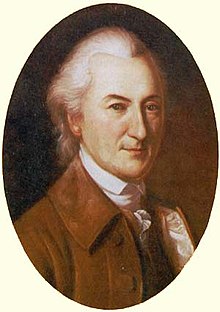John Dickinson (politician)
| John Dickinson | |
|---|---|
 |
|
| 5th President of Pennsylvania | |
|
In office November 7, 1782 – October 18, 1785 |
|
| Vice President |
James Ewing James Irvine Charles Biddle |
| Preceded by | William Moore |
| Succeeded by | Benjamin Franklin |
| President of Delaware | |
|
In office November 13, 1781 – January 12, 1783 |
|
| Preceded by | Caesar Rodney |
| Succeeded by | John Cook |
| Continental Congressman from Delaware |
|
|
In office January 18, 1779 – February 10, 1781 |
|
| Continental Congressman from Pennsylvania |
|
|
In office August 2, 1774 – November 7, 1776 |
|
| Personal details | |
| Born | November 8, 1732 (November 2 or 4, respectively, in the "old style" Julian calendar used at time) Talbot County, Province of Maryland, British America |
| Died | February 14, 1808 (aged 75) Wilmington, Delaware, U.S. |
| Resting place | Friends Burial Ground, Wilmington |
| Political party | Democratic-Republican |
| Spouse(s) | Mary (Polly) Norris |
| Residence |
Kent County, Delaware Philadelphia, Pennsylvania Wilmington, Delaware |
| Religion | Quakers (associated) |
John Dickinson (November 8, 1732 – February 14, 1808), a Founding Father of the United States, was a solicitor and politician from Philadelphia, Pennsylvania and Wilmington, Delaware known as the "Penman of the Revolution" for his twelve Letters from a Farmer in Pennsylvania, published individually in 1767 and 1768. As a member of the First Continental Congress, where he was a signee to the Continental Association, Dickinson drafted most of the 1774 Petition to the King, and then as a member of the Second Continental Congress wrote the 1775 Olive Branch Petition, two attempts to negotiate with King George III of Great Britain. When these failed, he reworked Thomas Jefferson's language and wrote the final draft of the 1775 Declaration of the Causes and Necessity of Taking Up Arms. When Congress then decided to seek independence, Dickinson served on the committee that wrote the Model Treaty, and then wrote the first draft of the 1776–1777 Articles of Confederation and Perpetual Union.
Dickinson later served as President of the 1786 Annapolis Convention, which called for the Constitutional Convention of 1787, which Dickinson then attended as a delegate from Delaware.
He also wrote "The Liberty Song" in 1768, was a militia officer during the American Revolution, President of Delaware, President of Pennsylvania, and was among the wealthiest men in the British American colonies. Upon Dickinson's death, President Thomas Jefferson recognized him as being "Among the first of the advocates for the rights of his country when assailed by Great Britain whose "name will be consecrated in history as one of the great worthies of the revolution.""
...
Wikipedia
